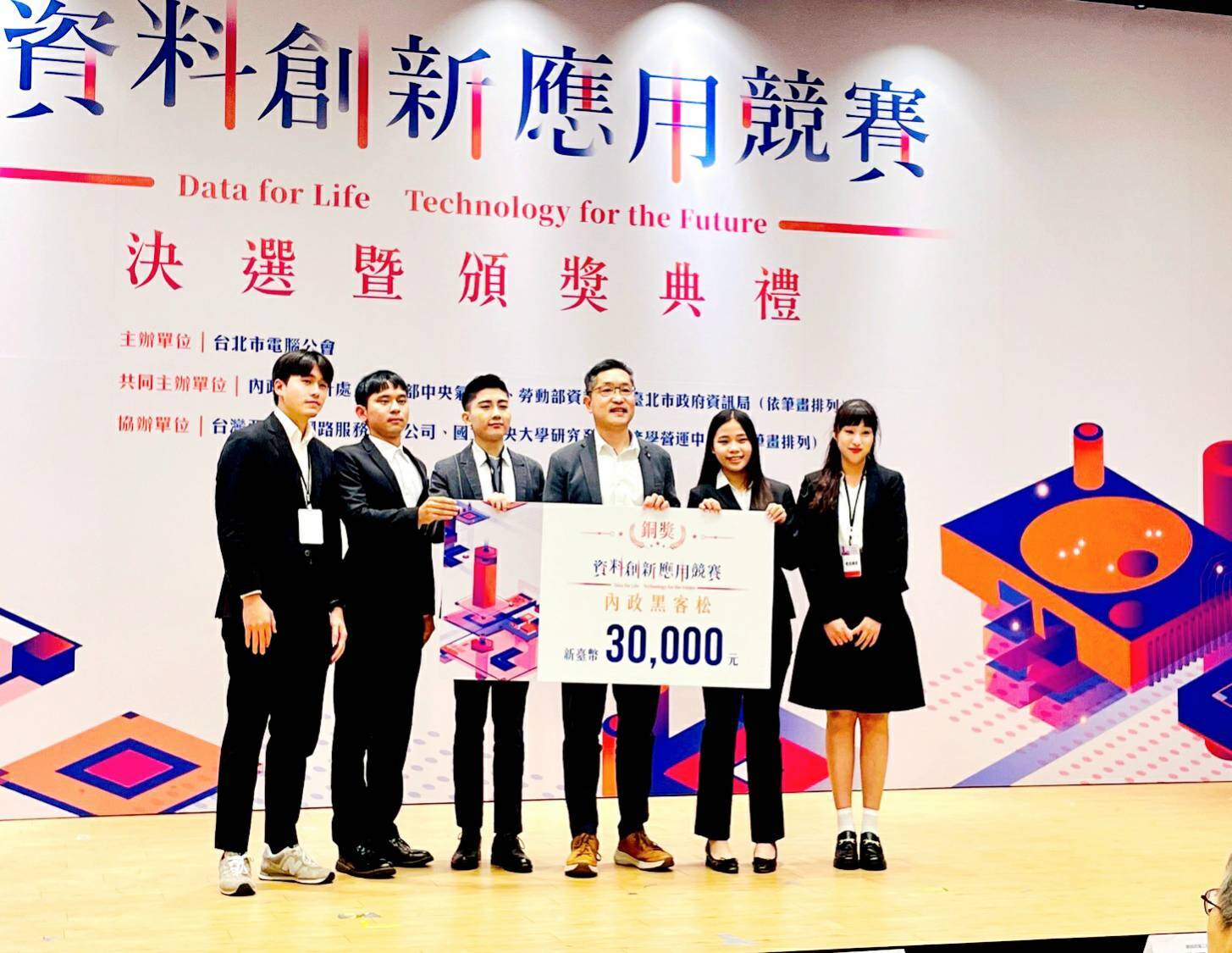SDG9
NCKU's team placed third in the 2023 Data Innovation Competition for using AI to aid the elderly
The interdisciplinary team "老成練達" from National Cheng Kung University (NCKU), consisting of students from the accounting, computer science, law, and architecture departments, secured the third-place honor in the "2023 Data Innovation Application Competition" organized by the Taipei Computer Association and the Ministry of the Interior Statistics Office.
The team introduced the concept of an "AI Silver-Hair Resource Allocation Platform" to realize a new integrated resource platform combining big data applications and AI. The team participated in the "Interior Hackathon Group" category of the competition.
The team, comprising members Chia-Yuan Chung, Tsung-Lin Lee, Chia-Yu Lin, Chen-Yu Liang, and Jui-Hung Lin, showcased the advantages of interdisciplinary collaboration. Their AI Silver-Hair service system, named Resource Allocation Platform (Smart RAP), addresses issues related to Taiwan's aging society, leveraging the recent rise of CHATGPT to propose the idea of combining "AI Q&A with Big Data Science for Resource Allocation." This approach aims to tackle issues such as loneliness and resource mismatch in Taiwan's aging society.
Differentiating itself from users searching government-published silver-hair data online, the team proposed integrating big data from the Ministry of the Interior Statistics Office. Through various human-machine interfaces and programming assistance, users can more conveniently and quickly utilize these data resources. Additionally, by incorporating the recent CHATGPT technology, the team seeks to effectively address issues related to loneliness and resource allocation in Taiwan's aging society.
One of the technical highlights of "AI Silver-Hair Resource Allocation Platform Smart RAP" is the integration of CHATGPT with Taiwan's relevant big data for answering questions. This approach eliminates the need for users to analyze and assist further with other software after viewing public silver-hair data online. The team believes that this method effectively applies AI to decision-making suggestions, enabling users to quickly grasp the direction of their thinking.
Furthermore, Smart RAP includes features such as common data analysis and chart presentation, along with the integration of the Google Street View and GIS map systems, effectively presenting spatial relationships. The platform provides users with diverse services within this integrated system.
The team added another innovative idea to the platform—matching services. This enhancement significantly increases the commercial value of Smart RAP, allowing users not only to obtain organized comparative data on the platform but also to understand the actual situation in terms of spatial geography. Users receive AI-based recommendations for future decision-making and personalized suggestions. Moreover, users can engage in job applications on the platform, acting as both information and contact facilitators, providing potential solutions to the shortage of long-term care personnel and education resources.
The three major features of Smart RAP are "demand prediction," "diversified matching," and "resource optimization and allocation."
The team members shared their thoughts on the competition. Chia-Yu Lin, responsible for copywriting, product marketing, and demo video editing, expressed her aspiration as a law student to integrate government long-term care services through the platform. She aims to improve the utilization of long-term care resources and, in the future, combine her legal expertise to provide legal services, such as property planning and legal consultation, creating a more livable and friendly aging society.
Tsung-Lin Lee mentioned that the competition taught him many things not covered in the classroom, and he is honored to use his technical expertise to help with social issues related to long-term care.
Chen-Yu Liang, with a background in law and political science, discussed the value of social science training, allowing him to break down issues and analyze the pain points of long-term care. He emphasized the importance of cross-disciplinary collaboration in creating innovative solutions.
Jui-Hung Lin, from the digital group of the architecture department, highlighted the rare opportunity to participate in an AI and big data-related competition from a different field. The experience allowed him to familiarize himself with various professional fields and witness the creative possibilities that cross-disciplinary thinking can bring.
Chia-Yuan Chung, an accounting student and president of the school's data analysis club, appreciated the teamwork during the competition. He noted the achievement of turning the initial concept into a significant accomplishment, feeling the strength brought by different fields of expertise. He expressed gratitude for the support of teammates and considered the award a small affirmation for the team.
The "2023 Data Innovation Application Competition" was jointly organized by the Taipei Computer Association and government agencies such as the Ministry of the Interior Statistics Office, the Central Weather Bureau of the Ministry of Transportation, the Information Department of the Ministry of Labor, and the Information Bureau of the Taipei City Government. Amazon Web Services Taiwan also assisted in coordinating the competition. The event aimed to foster interaction between teams and organizing members through workshops before the final competition, encouraging mutual learning and inspiring innovation to promote the development of data innovation.
The competition attracted over 100 teams from all over Taiwan, with a selection process starting in May, followed by an application period in July, and the final competition held at the end of August. The finals took place at C.C.Work, the Zhongqi Business Center, and the Ping An Building in Zhongzheng District, Taipei City. The event had enthusiastic participation from the Taipei Computer Association, the Ministry of the Interior, and co-organizing units such as Amazon. This strong support from the government, academia, and industry sectors in Taiwan emphasizes the significance of data innovation and the application of big data in the future. The expectation is that Taiwan can keep pace with technological trends, leading to new developments and possibilities in the field of data innovation.
The team introduced the concept of an "AI Silver-Hair Resource Allocation Platform" to realize a new integrated resource platform combining big data applications and AI. The team participated in the "Interior Hackathon Group" category of the competition.
The team, comprising members Chia-Yuan Chung, Tsung-Lin Lee, Chia-Yu Lin, Chen-Yu Liang, and Jui-Hung Lin, showcased the advantages of interdisciplinary collaboration. Their AI Silver-Hair service system, named Resource Allocation Platform (Smart RAP), addresses issues related to Taiwan's aging society, leveraging the recent rise of CHATGPT to propose the idea of combining "AI Q&A with Big Data Science for Resource Allocation." This approach aims to tackle issues such as loneliness and resource mismatch in Taiwan's aging society.
Differentiating itself from users searching government-published silver-hair data online, the team proposed integrating big data from the Ministry of the Interior Statistics Office. Through various human-machine interfaces and programming assistance, users can more conveniently and quickly utilize these data resources. Additionally, by incorporating the recent CHATGPT technology, the team seeks to effectively address issues related to loneliness and resource allocation in Taiwan's aging society.
One of the technical highlights of "AI Silver-Hair Resource Allocation Platform Smart RAP" is the integration of CHATGPT with Taiwan's relevant big data for answering questions. This approach eliminates the need for users to analyze and assist further with other software after viewing public silver-hair data online. The team believes that this method effectively applies AI to decision-making suggestions, enabling users to quickly grasp the direction of their thinking.
Furthermore, Smart RAP includes features such as common data analysis and chart presentation, along with the integration of the Google Street View and GIS map systems, effectively presenting spatial relationships. The platform provides users with diverse services within this integrated system.
The team added another innovative idea to the platform—matching services. This enhancement significantly increases the commercial value of Smart RAP, allowing users not only to obtain organized comparative data on the platform but also to understand the actual situation in terms of spatial geography. Users receive AI-based recommendations for future decision-making and personalized suggestions. Moreover, users can engage in job applications on the platform, acting as both information and contact facilitators, providing potential solutions to the shortage of long-term care personnel and education resources.
The three major features of Smart RAP are "demand prediction," "diversified matching," and "resource optimization and allocation."
The team members shared their thoughts on the competition. Chia-Yu Lin, responsible for copywriting, product marketing, and demo video editing, expressed her aspiration as a law student to integrate government long-term care services through the platform. She aims to improve the utilization of long-term care resources and, in the future, combine her legal expertise to provide legal services, such as property planning and legal consultation, creating a more livable and friendly aging society.
Tsung-Lin Lee mentioned that the competition taught him many things not covered in the classroom, and he is honored to use his technical expertise to help with social issues related to long-term care.
Chen-Yu Liang, with a background in law and political science, discussed the value of social science training, allowing him to break down issues and analyze the pain points of long-term care. He emphasized the importance of cross-disciplinary collaboration in creating innovative solutions.
Jui-Hung Lin, from the digital group of the architecture department, highlighted the rare opportunity to participate in an AI and big data-related competition from a different field. The experience allowed him to familiarize himself with various professional fields and witness the creative possibilities that cross-disciplinary thinking can bring.
Chia-Yuan Chung, an accounting student and president of the school's data analysis club, appreciated the teamwork during the competition. He noted the achievement of turning the initial concept into a significant accomplishment, feeling the strength brought by different fields of expertise. He expressed gratitude for the support of teammates and considered the award a small affirmation for the team.
The "2023 Data Innovation Application Competition" was jointly organized by the Taipei Computer Association and government agencies such as the Ministry of the Interior Statistics Office, the Central Weather Bureau of the Ministry of Transportation, the Information Department of the Ministry of Labor, and the Information Bureau of the Taipei City Government. Amazon Web Services Taiwan also assisted in coordinating the competition. The event aimed to foster interaction between teams and organizing members through workshops before the final competition, encouraging mutual learning and inspiring innovation to promote the development of data innovation.
The competition attracted over 100 teams from all over Taiwan, with a selection process starting in May, followed by an application period in July, and the final competition held at the end of August. The finals took place at C.C.Work, the Zhongqi Business Center, and the Ping An Building in Zhongzheng District, Taipei City. The event had enthusiastic participation from the Taipei Computer Association, the Ministry of the Interior, and co-organizing units such as Amazon. This strong support from the government, academia, and industry sectors in Taiwan emphasizes the significance of data innovation and the application of big data in the future. The expectation is that Taiwan can keep pace with technological trends, leading to new developments and possibilities in the field of data innovation.
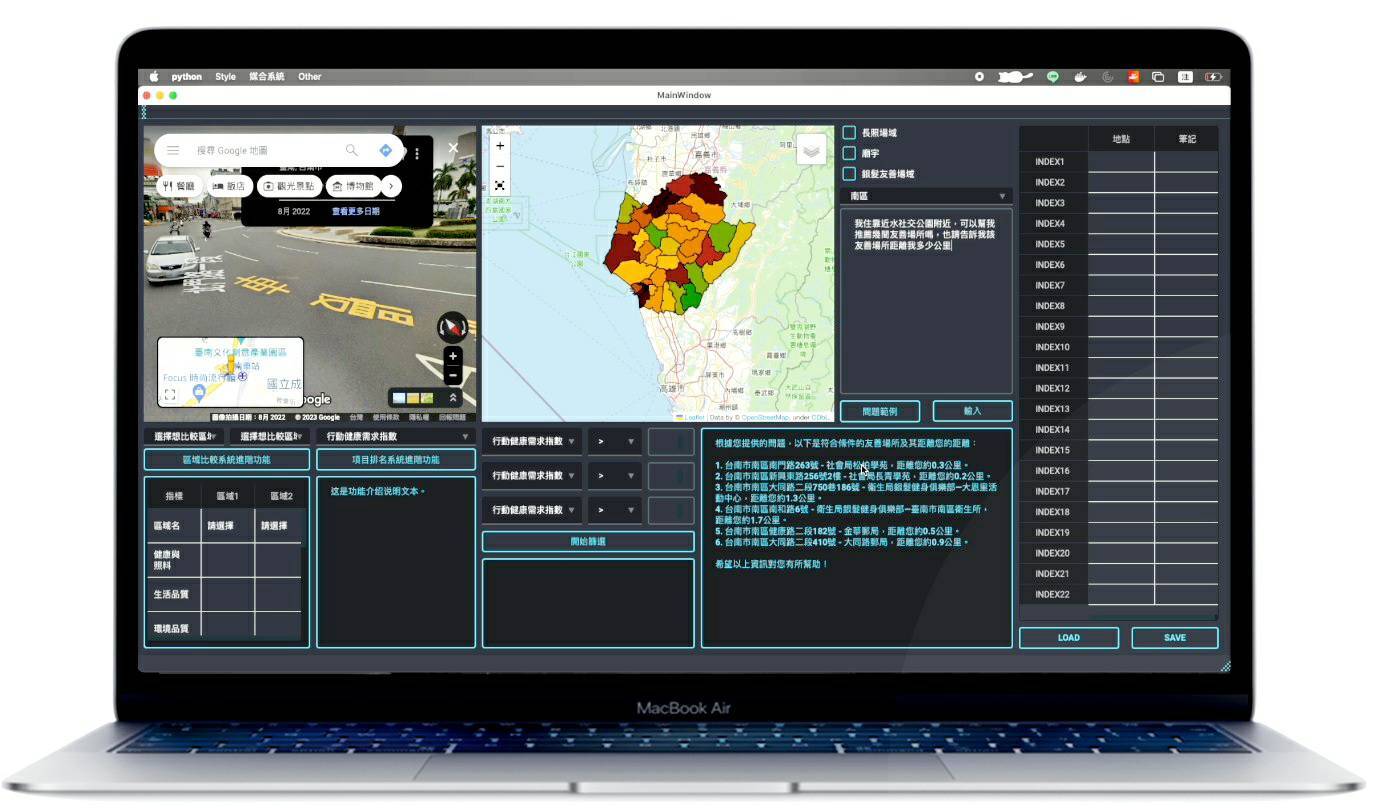
The three key features of Smart RAP include "Demand Forecasting," "Diversified Matchmaking," and "Resource Optimization and Allocation."
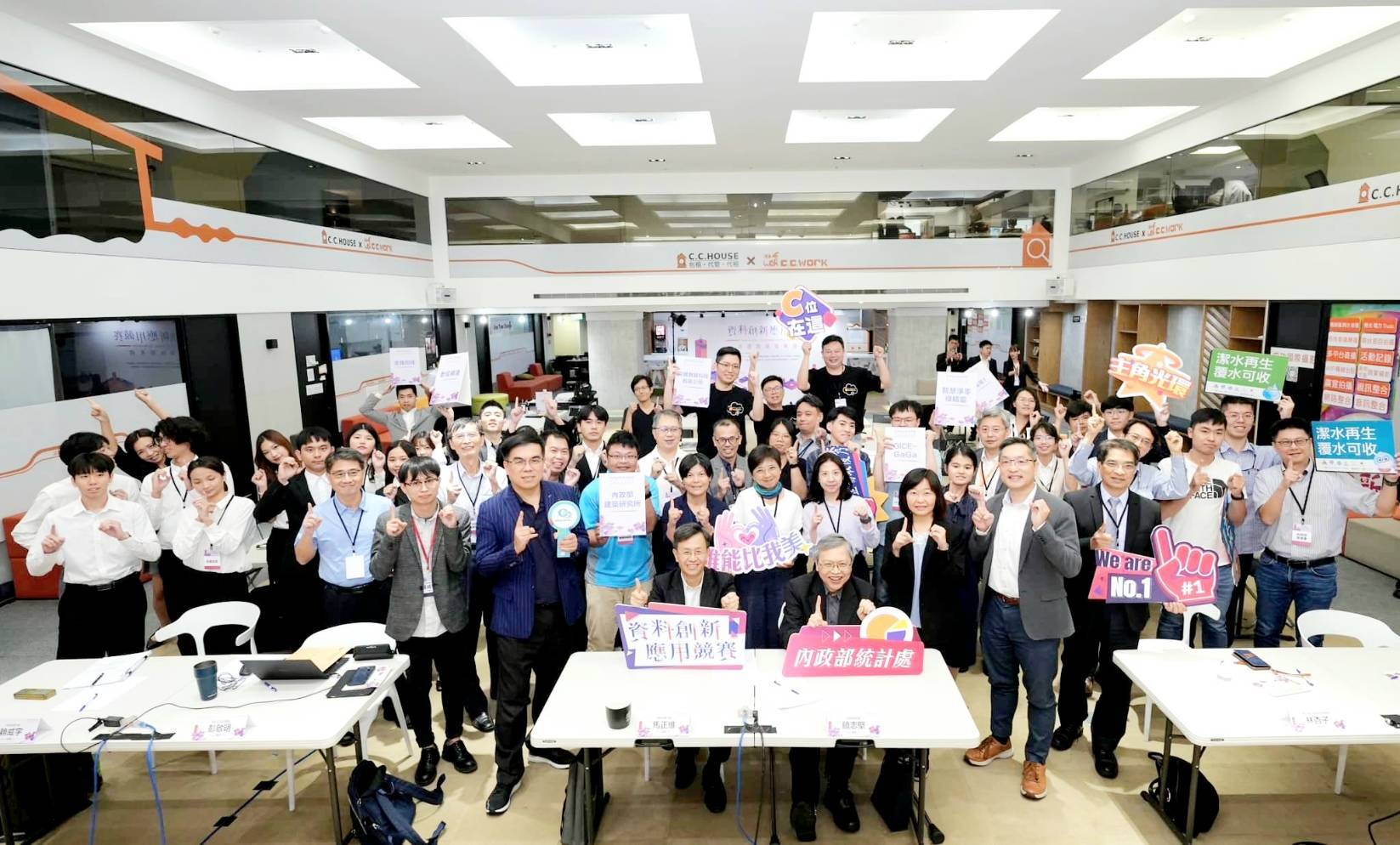
Finalist Team Photo
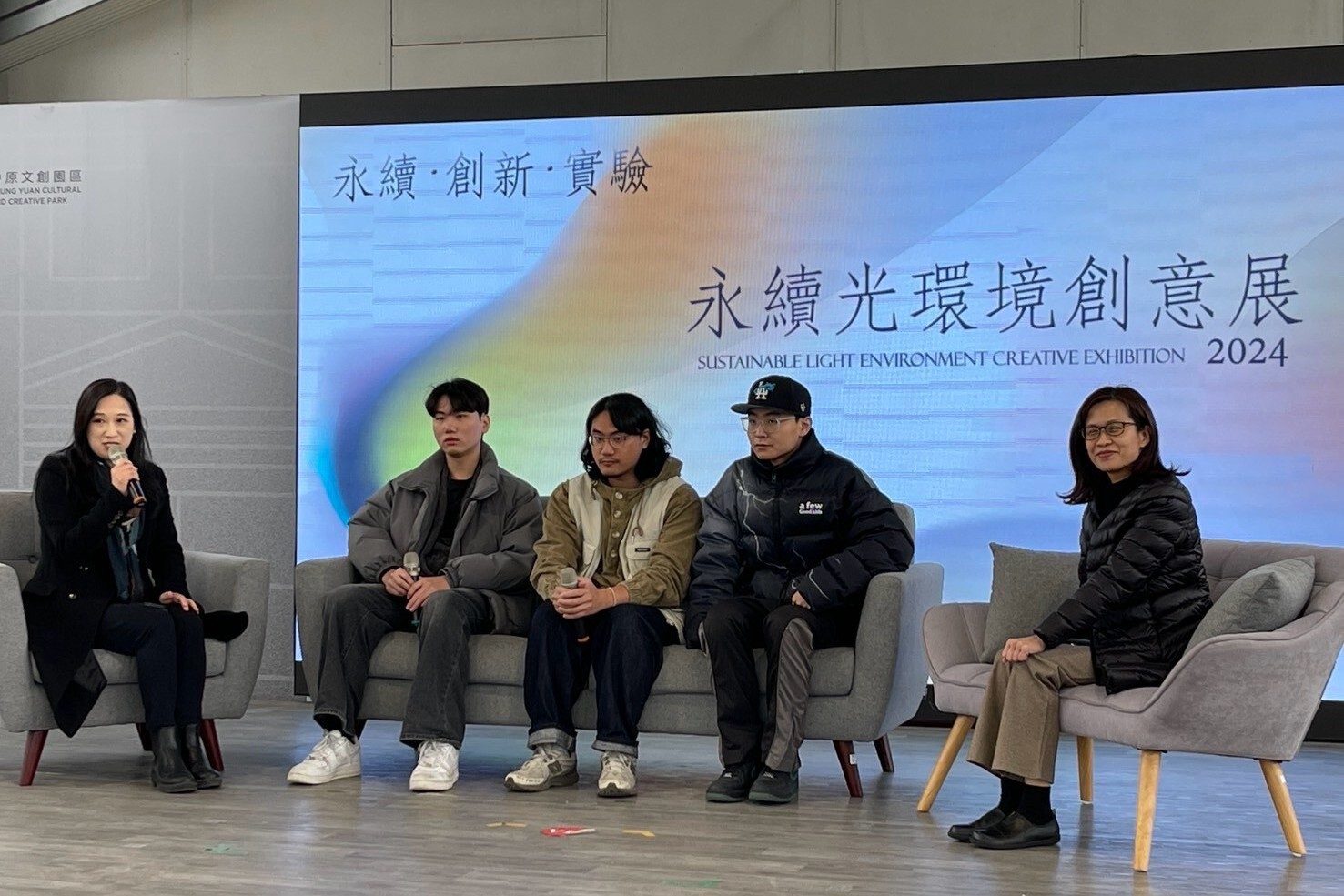
SDG9NCKU Architecture Team’s “Surge” Wins Silver at Sustainable Lighting Exhibition, Donated for Permanent Display
View more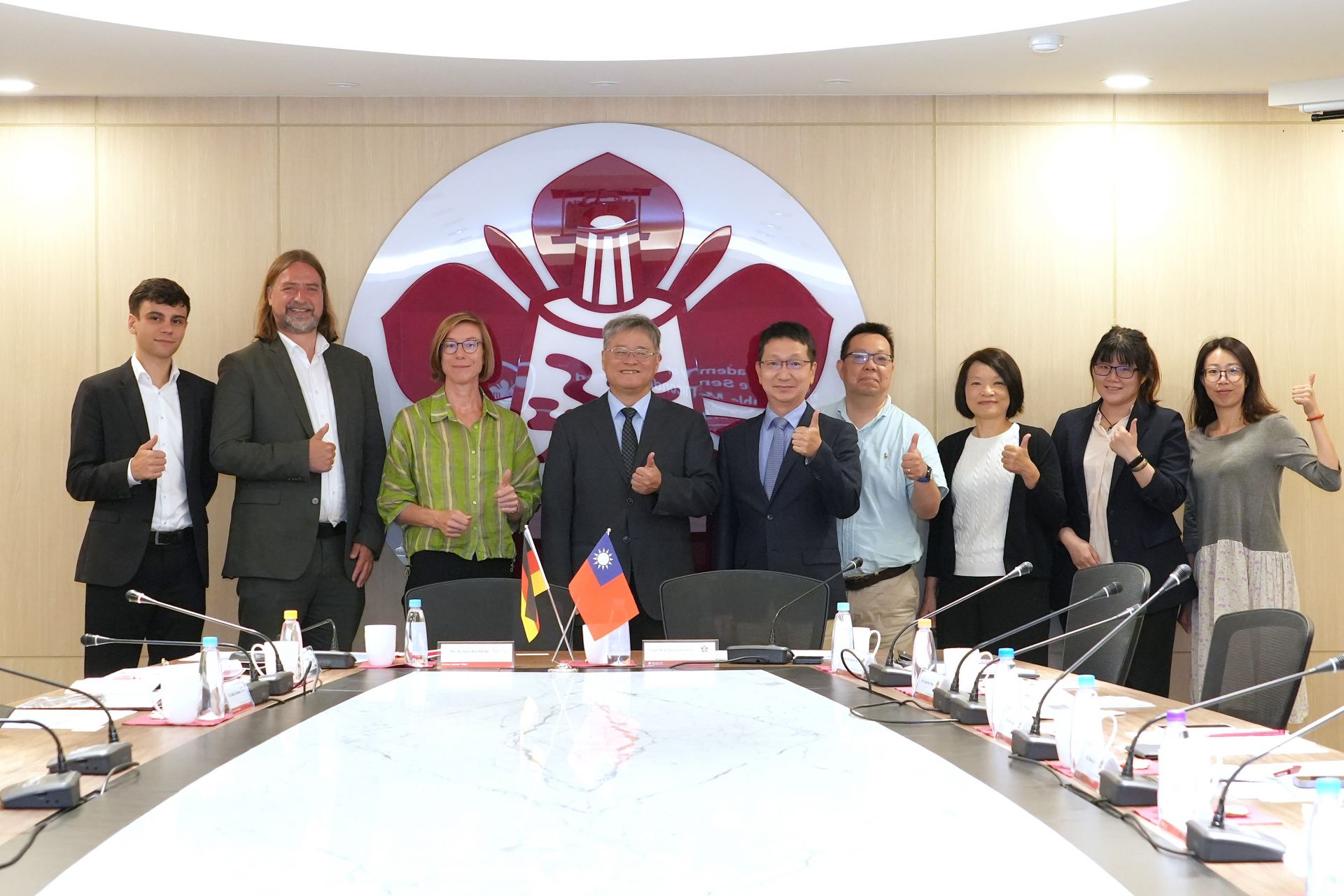
SDG9German Institute Taipei and Saxon Science Liaison Office Visit NCKU to Ex-plore Semiconductor Talent Development Cooperation
View more

